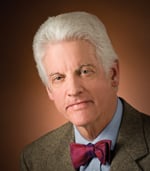A Foundation for Healthy Communities

Bill Neukom.
Photo by Kevin Cruff
Imagine how much our world would change if we could not negotiate enforceable agreements, if we did not have access to impartial courts to resolve disputes, if police could not be trusted to fairly enforce the law, and if statutes protecting the environment and human safety could be ignored with impunity.
Unfortunately, many Americans and citizens of other nations do not have to imagine such bitter scenarios at all. They are a part of daily experience in communities where the rule of law has broken down. Despite good intentions, efforts to advance health, safety and economic opportunity in such settings are thwarted routinely.
Leaders of widely diverse professions—from nations on every continent—will gather in Vienna, Austria, with a shared belief: We will all gain by strengthening the rule of law.
MULTIDISCIPLINARY DIALOGUE
The World Justice Forum, which will take place July 2-5, will engage stakeholders from across civil society. In addition to judges and lawyers, it will include leaders in such disciplines as architecture, arts, business, education, engineering, environment, faith, human rights, labor, law, law enforcement, media, military, public health and public safety.
Sponsors include the World Federation of Public Health Associations, Human Rights Watch, the U.S. and International Chambers of Commerce, the International Trade Union Confederation, the Association of International Educators, and the American Society of Civil Engineers.
The goal of the forum is to establish an ongoing World Justice Project, which will seek to make advancing the rule of law a mainstream goal of all major disciplines.
Is it significant that such divergent organizations are joining lawyers and judges in focusing on the rule of law? And can nonlawyer groups make significant contributions in advancing the rule of law in the United States and other nations?
Emphatically, the answer is yes.
As defined by the World Justice Project, the rule of law is of prime importance to virtually everyone.
The rule of law is based on four principles: (1) the government and its agents are accountable to the law; (2) laws are clear, stable and fair, and protect fundamental rights, including property and personal security; (3) laws are enacted and enforced through an accessible, fair and efficient process; and (4) laws are upheld, and access to justice is provided by competent, ethical and independent enforcement officers, lawyers and judges.
Experience shows these conditions correlate closely to economic and political freedom. They also directly support such essential needs as health, education, physical security and basic human rights. And importantly, they are universal, not related to any one nation’s values or legal tradition.
As leaders try to solve such diverse problems as terrorism, poverty, corruption, lack of education and the growing threat of health pandemics, it is hard to imagine significant progress without a fundamental improvement in institutions of law and justice.
Lawyers and judges cannot achieve these goals alone. When communities work together to establish the rule of law, it can be a compelling force for change.
While Americans celebrate their independence on July 4, scholars in Vienna will debate the impact of the rule of law on basic human needs, and the project will unveil the first results of its comprehensive rule of law index and incubate new, multidisciplinary rule of law projects.
It is the vision of the World Justice Project that multidisciplinary coalitions for justice will become the norm—that doctors, lawyers, educators, engineers and clergy, for instance, can work together for a common cause. And that these efforts will reinforce for entire communities the need for the rule of law if we are to survive and prosper.



